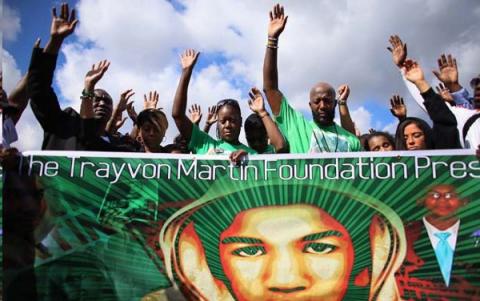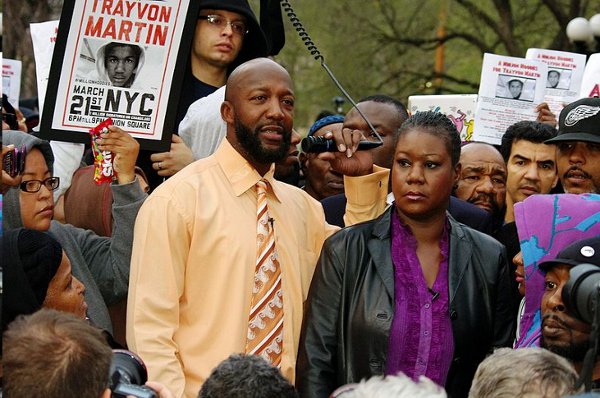Fla. Task Force Gives Surprising Vote of Confidence to ‘Stand Your Ground’ Law

From New America Media and Colorlines.com:
In the year since George Zimmerman followed, fought and killed unarmed teenager Trayvon Martin, Florida’s Stand Your Ground law has been under national scrutiny. One of more than a dozen similar statues around the country, Florida’s law allows a civilian to use fatal force outside of his or her home if “he or she reasonably believes that such force is necessary to prevent imminent death or great bodily harm to himself or herself or another.” Stand Your Ground also authorizes people to use deadly force if they “reasonably believe” that a violent felony is about to happen.
Critics, including Martin’s parents, have called Stand Your Ground laws (contained in Section 776 of Florida Statutes) an invitation for vigilante violence and civilian racial profiling. Despite widespread outrage over Martin’s slaying, a 19-member task force assembled by Florida Governor Rick Scott (R) has found no grounds to overturn the law.
The findings of the Task Force on Citizen Safety and Protection report released on February 22nd boil down to this: The problem doesn’t lay with the law but with some people who have tried to use it. From the report:
“The Task Force concurs with the core belief that all persons, regardless of citizenship status, have a right to feel safe and secure in our state. To that end, all persons who are conducting themselves in a lawful manner have a fundamental right to stand their ground and defend themselves from attack with proportionate force in every place they have a lawful right to be.”
The group instead recommended a tightening of standards for neighborhood watch groups and the commissioning a study to examine unintended racial disparities. For some, the findings did not come as a surprise.
“It’s what I expected,” state senator Christopher L. Smith, a Democrat who assembled his own group to study Section 776, told the News Service of Florida. “[Scott] put together a task force together of people who wrote the bill and full of people who support Stand Your Ground. I knew the task force wouldn’t come up with anything earth-shattering in their final report.”

The Corporate Politics of Stand Your Ground
Florida was just the first of 23 states to rapidly adopt such laws between 2005 and 2011. But shortly after Martin’s death, activists and researchers from the Center for Media and Democracy’s PR Watch project and Color of Change won a decisive victory against special interests fueling Stand Your Ground by exposing the role of American Legislative Exchange Council (ALEC) in spreading the laws. Working with the National Rifle Association, the corporate-funded lobbying group drafted and circulated model Stand Your Ground bills among mostly Republican pols who would, in turn, take them to their statehouses. After a popular petition and widespread press linking ALEC to the Trayvon Martin case, more than 40 corporations including Amazon.com, Coca-Cola, General Electric and General Motors said they were severing their ties to ALEC. In April, ALEC announced that it was dropping its social policy program, which covered Stand Your Ground, to focus instead on economic issues.
Concerns About Safety and Racial Bias
Political process aside, experts are asking if Stand Your Ground actually makes people safer. According to a study released this year by Texas A&M economist Mark Hoekstra, the laws have a “zero deterrence” effect, meaning that they don’t actually stop violent events from taking place. Specifically, the study concluded that the laws do not deter burglary, robbery or aggravated assault, but they do lead to an 8 percent net increase in the number of reported murders and cases of non-negligent manslaughter.
So far, it’s been difficult to measure how racism influences the judgement calls civilians, police and prosectors make in Stand Your Ground cases. Still, after Martin’s death, the U.S. Commission on Civil Rights voted in favor of studying how racial bias “may affect the operation of these laws—in the perceptions and motivations of perpetrators, in law enforcement investigation, and in judicial outcomes.”
“Give the paucity of data and the high stakes, jumping to conclusions benefits no one,” said Commissioner Michael Yaki after he proposed the special investigation. “As the nation’s watchdog on civil rights, the Commission on Civil Rights has the power and the duty to engage in research and fact-finding to determine whether substantial facts of racial bias exist if we are to engage in and direct a national conversation on these laws.”
The Tampa Bay Times did an analysis of 200 Stand Your Ground cases in Florida and found that it was inconsistently applied. The paper found that nearly 70 percent of those who invoke the statute go free. But—most importantly—the study found that an astonishing 73 percent of defendants whose victims were black faced no penalty, as opposed to 59 percent of those who killed a white person.
“I don’t think judges or prosecutors or whoever works in the field of criminal justice is consciously saying black life is worth less than that of other ethnicities,” Kareem Jordan, a criminologist at the University of Central Florida, told the Tampa Bay Times. “But at the end of the day, it could be something that’s subconscious [sic] going only if you look at how the media depicts black life.”
Photos: Colorlines; David Shankbone (Flickr, Creative Commons).





























































































































































































































































































































